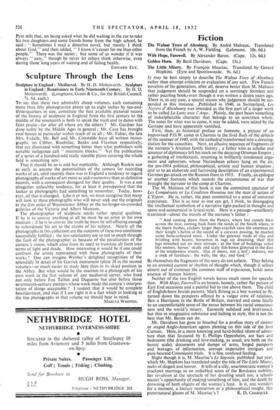Fiction
The Walnut Trees of Altenburg. By Andre Malraux. Translated from the French by A. W. Fielding. (Lehmann. 10s. 6d.) The Little Misery. By Francois Mauriac. Translated by Gerard Hopkins. (Eyre and Spottiswoode. 9s. 6d.) IT may be best simply to describe The Walnut Trees of Altenburg rather than attempt criticism or evaluation of any sort. Few French novelists of his generation, after all, deserve better than M. Malraux that judgement should be suspended on a seemingly formless and rather puzzling book,. even though it was written a dozen years ago. There is, in any case, a special reason why judgement should be sus- pended in this instance. „Published in 1940, in Switzerland, Les Noyers d' Altenbourg was intended as the first part of a larger work to be called La Lutte avec l' Ange. Plainly, the part bears something of indecipherable character that belongs to an unwritten whole. The notes for what was to come, it may be added, were seized by the Gestapo and have apparently vanished.
First, then, as historical preface or footnote, a picture of an improvised P.O.W. camp in Chartres in the livid flush of the debacle of the summer of 1940, with the cathedral transformed into a dressing- station for the casualties. Next, an allusive sequence of fragments of the narrator's Alsatian family history ; a father who as scholar and amateur of diplomacy left his mark on the decaying Ottoman Empire ; a gathering of intellectuals, resuming in brilliantly condensed argu- ment and aphorism, whose Nietzschean echoes hang on the air, the pre-1914 political, philosophical, artistic and human situation ; and so to an elaborate and harrowing description of an experimental German gas attack on the Russian front in 1915. Finally, an epilogue or another footnote which records the circumstance of war that brought the narrator to the camp at Chartres.
The M. Malraux of this book is not the committed spectator of Les Conquerants or La Condition Humaine nor the man of action of L'Espoir. He is, rather, the poet committed to a sense of universal experience. This is as near as one can get, I think, to disengaging the intellectual symbolism of a narrative tight-packed in thought and spare and economical in lyrical style. Here is a passage—excellently translated—about the travels of the narrator's father : "And coming down from the Pamirs, where lost camels bleat across the mist, coming back from the sands of the South where, in the thorn bushes, crickets larger than crayfish raise the antennae on their knight's helms at the sound of a caravan passing, he reached some bone-coloured town. Under the gateway made of clay and bristling with beams, horsemen in rags sat dreaming, their thin legs stretched out on their stirrups ; at the foot of buildings veiled like women, horses' skulls and scaly fish-bones glittered in the dust of the windowless streets. Out of doors, not a leaf ; indoors, not a stick of furniture : the wells, the sky, and God."
By themselves the fragments of the story do not cohere. They belong to an arrested current or rhythm of thought which, though it refines almost out of existence the common stuff of experience, holds some essence of human history.
Neither of the two English novels leaves much room for specula- tion. With Hope, Farewell is an honest, homely, rather flat picture of East End occasions and a painful bid to rise above them. The child of English-born Jewish parents, Mark Strong as a boy wanted to fly, turned down the prospects offered by a vulgar crew of relations, flew a Hurricane in the Battle of Britain, married and came finally to an uncomfortable sense of the nexus between his racial conscious- ness and the world's misery. Earnestly subdued and level-toned, but thin in imaginative substance and halting in style, this is not the best that Mr. Baron can do.
Mr. Davidson has gone to Istanbul for a profuse story of sinister or stupid Anglo-American agents plotting on this side of the Iron Curtain. Here, in a more knowing and hard-boiled idiom of adven- ture than that favoured by E. Phillips Oppenheim, are bars and bedrooms (the drinking and love-making, as usual, are both on the heroic scale), documents and dumps of arms, forged passports and leakages of information, corrupt imperialist intrigues and pure-hearted Communist trials. It is fine, confused feeding.
Slight though it is, M. Mauriac's Le Sagouin, published last year, which Mr. Hopkins has translated under the title of The Little Misery, reeks of disgust and horror. It tells of a silly, unaristocratic woman's crackpot marriage to an enfeebled scion of the Bordeaux nobility, her revulsion at the spectacle of her drooling small son, a school- master's opportunity of making something of him, and the death by drowning of both objects of the woman's hate. Is it, one wonders for a moment, a literary mannerism or a philosophical insight, this preternatural gloom of M. Mauriac's ? R. D. CHARQUES-


































 Previous page
Previous page